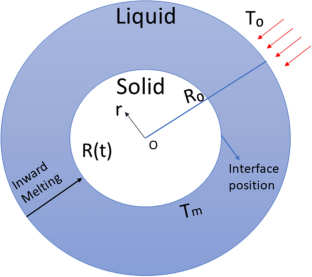Numerical study of the melting process of spherical phase change material with variable thermal conductivity
Abstract
This paper addresses the melting of phase change solid sphere, which motivates researchers to develop new thermal energy storage (TES) systems techniques. Phase change materials can store or release large amounts of heat in short intervals of time, thus improving the thermal performance of cooling and heating systems in buildings and regulate the temperature of PV systems, batteries and other electronic components. We have considered a convective spherical Stefan problem with thermal conductivity as a function of time and temperature. The heat balance integral method (HBIM) is used to find the problem’s solution numerically. The temperature profile is approximated by using n degree polynomial. The influence of governing parameters on the location of melting front and temperature profile is discussed thoroughly. The parameters depict that transition from solid to liquid phase becomes fast for higher values of Stefan number while the transition rate slows down for larger values of Peclet number. The melting rate increases from 20% to 80% when Stefan number rises from 0.1 to 1.0 at a particular time. Moreover, a comparative study of the proposed model with some existing models is being done. It is observed that moving melting front for the assumed problem undergoes a fast melting process.


 求助内容:
求助内容: 应助结果提醒方式:
应助结果提醒方式:


